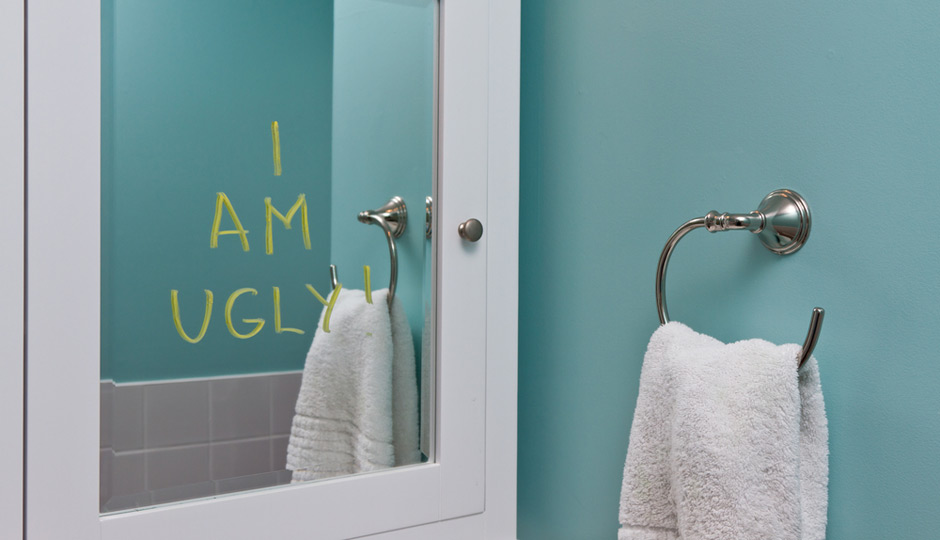“No Body Talk” Summer Camps: Is This a Good Thing?

Shutterstock.com
Last week the New York Times ran an article on a couple of summer camps that enforce a “no body talk” rule. As one such camp’s founder, Vivian Stadlin, explains it, this means that while at camp, kids and counselors “take a break from mentioning physical appearance, including clothing. And it’s about myself or others, be it negative, neutral or even positive.”
My first reaction to the article was, “What a great idea!” At Stadlin’s camp, Eden Village, campers are taught to give compliments like “Your soul shines” or “I feel so happy to be with you.” Signs on bathroom mirrors read, “Don’t check your appearance, check your soul.” Another chain of camps, Rosie’s Girls, takes this a step further and covers mirrors completely, so that campers won’t even be tempted to judge themselves.
Talk about people’s appearances is endemic in our culture. Even the most supposedly feminist websites have trouble clamping down on commenters’ tendency to snicker at and chide the rich and famous when they put on pounds or turn out in public with messy hair. I value my (wonderful) female colleagues for their dedication, their hard work, their brains — but I’m apt to pay them compliments, instead, on a new outfit, a haircut, or a pair of shoes. That, I guess, is the point of the “no body talk” camps — to make campers (and they’re not just for girls) aware that, frankly, there are better and more interesting things to talk about than the way we and others look. The Times quotes a 14-year-old girl who’s headed to Eden Village for her fourth year this summer and says that at the camp, “People really like me for who I am and not what I look like, and people actually pay attention to the sort of person that I am. Your dress isn’t really you, it’s just something you bought.”
That’s a sentiment I’d be pleased to have my daughter share. And I know in her heart she does — or she wants to, at least. But I also know how happy it makes her when I buy her a cute new skirt at T.J. Maxx. Appearance and self aren’t as easy to separate as that 14-year-old girl thinks. A British study a few years back showed that young girls spent almost as much time each day on their appearance — fixing hair, putting on makeup — as on their homework: 42 minutes for the former and 52 for the latter. The study’s authors said that insecurity about appearance was linked to girls’ future career plans: Those with low self-esteem were less likely to hold high aspirations for their futures.
I’m gobsmacked, at times, by contemporary Americans’ attention to appearance. Bikini waxes, liposuction, lip plumping, butt enhancement, hair extensions, body cleanses — such a world of time and effort and money spent on our outsides, both female and male! It seems especially distasteful when so much of the world lacks basic sanitation, much less access to spas. But I also know that a great haircut or the right pair of glasses — or a compliment on them — can really make a person’s day.
“No body talk” camps seem a little like burqa-donning. Not talking about our fat-shaming, size-ist, Eurocentric notions of beauty doesn’t really solve anything — not when Hollywood keeps making films starring princesses with whom princes fall in love at first sight. The Times quoted a psychologist, Lisa Morse, who noted, “Difficult and uncomfortable issues don’t go away because people hope they will. And they don’t go away because they are ignored.” She and other mental-health experts are concerned that not talking about body image and physical appearance could cause kids to bury worries and fears too weighty for them to deal with alone.
There was also news last week that the labels put on antidepressant drugs to warn that they can increase suicidal ideation in young people seem to have led to an increase in the number of suicide attempts by those ages 10 through 29. The authors of the study that revealed the increase say the warnings may have frightened doctors into not prescribing drugs that can relieve depression and parents into not seeking help for their children. You’re damned if you don’t, and you’re damned if you do.
In the article on summer camps, Lisa Morse noted that not discussing body issues does nothing to equip young people with tools to help them deal with unkind and demeaning comments once they’re back in the real world. It’s a tough knot. Summer camps have always been a weird mix of idealized oasis and Lord of the Flies, and even Quaker meetinghouses aren’t free of gossip and snark. Remember in the movie Witness when the old Amish woman tells Rachel, “Everyone has an idea about you and the Englishman, Book”? “All of them charitable, I‘m sure,” Rachel responds, to which the woman says, “Hardly any of them.” I don’t like to be cynical, but human nature being what it is, I’m not sure covering up our mirrors would do any good.
Follow @SandyHingston on Twitter.


